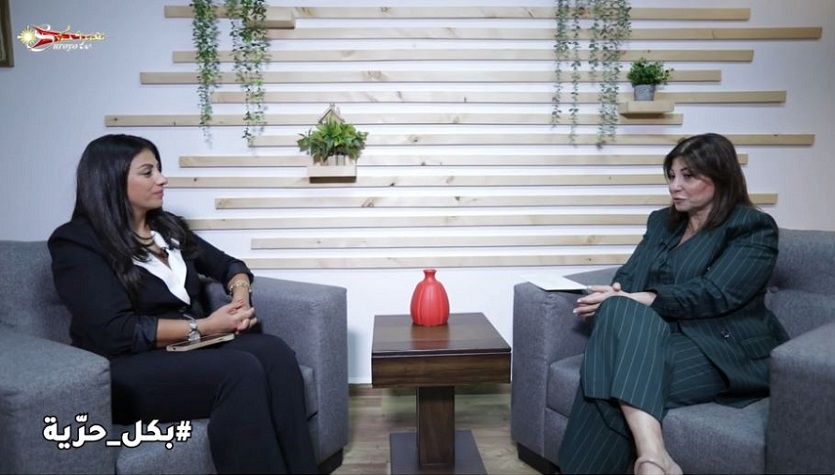LebTalks’ Christiane Gemayel: Lebanon has a golden opportunity right now to build a Rule-of-Law state
BEIRUT – Interview program Bkul Hirutho (“In al openness”), aired weekly on Suroyo TV, hosted an exclusive interview with Lebanese media personality Christiane Gemayel, journalist and founder and publisher of LebTalks Consultancy, to discuss Lebanon’s latest social and political developments.
Gemayel spoke about LebTalks Consultancy and its mission to instill values of perseverance and dedication to Lebanon, especially among the youth who are facing the country’s significant challenges. She emphasized that she and her team are fighting a daily survival struggle to move forward, with the ultimate goal of rebuilding Lebanon as a state with sound institutions, restoring its status as a “Beacon of the East,” and revitalizing Lebanon’s position as an engine of progress in the region.
Gemayel pointed out that Lebanon’s deteriorating conditions, largely caused by decades of political mismanagement, forced many Lebanese to emigrate. Yet, the diaspora has repeatedly demonstrated national loyalty by supporting their families during crises. She also shared the story of her daughter, who chose to return to Lebanon after completing her studies abroad, proving that Lebanon is not just a strip of land but an identity and a belonging. In this case, she cited Dr. Samir Geagea, leader of the Lebanese Forces, as a role model for Lebanese youth, especially Christians, including her own daughter. Geagea’s decision to stay in Lebanon despite having been imprisonment, she noted, embodies resilience and dedication to the nation.
On the issue of Lebanon’s electoral law and the diaspora’s right to vote, Gemayel stressed that every Lebanese citizen abroad should have the right to elect their representatives who will voice their concerns. Political parties that oppose granting full voting rights to expatriates fear the diaspora’s sovereigntist, anti-war stance. Allowing expatriates to vote would likely lead to the victory of sovereigntist opposition forces, undermining the influence of the Shiite duo Hezbollah and Amal, the “resistance axis.”
On Hezbollah’s disarmament following the destructive war with Israel, Gemayel criticized the group for dragging Lebanon into a conflict that only deepened its economic crisis. Despite ceasefire agreements, Hezbollah has failed to comply, leading to continued Israeli attacks and further losses. She also noted the government’s slow progress in enforcing Hezbollah’s disarmament, despite pressure from U.S. Envoy Thomas Barrack.
Gemayel condemned Hezbollah’s ”cult of martyrdom”, which manipulates Shiite youth into believing they are Israel’s primary targets. She said that many within the Shiite community reject this ideology and seek a normal life, free from regional conflicts.
Gemayel highlighted a global shift toward preventing wars in the Middle East to foster economic growth, citing examples like Syria’s reluctance to engage in new conflicts, Saudi Arabia’s Vision 2030, and China’s regional diplomacy. Even Russia remained neutral during the recent Iran-Israel tensions, despite its alliance with Iran.
She urged the people of Lebanon to seize this historic opportunity, embrace neutrality, as well as implement reforms to balance international relations, particularly with neighboring countries. Lebanon, she stressed, must disarm militias before parliamentary elections to ensure real change under President Joseph Aoun’s leadership.
Gemayel concluded by asserting that Lebanon’s battle is political, a fight to restore state authority, dismantle Hezbollah’s control, as well as establish the Lebanese Army as the sole armed force. With the right reforms, Lebanon can finally build a rule-of-law state and reclaim its role as a model of stability and progress in the region.
















